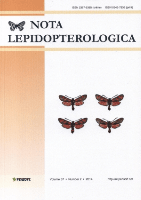
NOTA LEPIDOPTEROLOGICA
Scope & Guideline
Championing open access for groundbreaking research.
Introduction
Aims and Scopes
- Taxonomy and Systematics:
The journal publishes detailed taxonomic revisions and descriptions of new species across various families of Lepidoptera, contributing significantly to the understanding of Lepidopteran biodiversity. - Ecological Studies:
Research articles often explore the ecology, life history, and behavior of Lepidoptera, providing insights into their roles within ecosystems and responses to environmental changes. - Biogeography and Distribution:
Papers frequently address the distribution patterns of Lepidoptera, including historical and contemporary factors influencing their ranges, which is critical for conservation efforts. - Conservation Biology:
The journal includes studies on rare and endangered species, emphasizing the need for conservation strategies and highlighting the impacts of habitat loss and climate change. - Morphological and Genetic Analysis:
Research often integrates morphological assessments with molecular techniques, such as DNA barcoding, to clarify species boundaries and evolutionary relationships.
Trending and Emerging
- Molecular Phylogenetics:
An increasing number of studies are employing molecular techniques to resolve phylogenetic relationships among Lepidoptera, indicating a trend towards integrating genetic data with traditional morphological approaches. - Conservation and Climate Change Impact Assessments:
Research addressing the effects of climate change on Lepidopteran populations and their habitats is on the rise, highlighting an urgent need for conservation strategies in a rapidly changing environment. - New Species Discovery:
The journal has seen a surge in articles focused on the discovery and description of new species, reflecting a growing recognition of biodiversity and the importance of documenting lesser-known taxa. - Host Plant Interactions:
Studies exploring the relationships between Lepidoptera and their host plants, including novel feeding behaviors and adaptations, are becoming more prevalent, underscoring the ecological significance of these interactions. - Amber and Fossil Studies:
There is a notable increase in research related to Lepidoptera found in amber and other fossil contexts, contributing to the understanding of historical biodiversity and evolutionary processes.
Declining or Waning
- Behavioral Studies:
There has been a noticeable decline in publications focused specifically on the behavioral ecology of Lepidoptera, such as mating rituals and feeding behaviors, possibly due to a shift towards more taxonomic and conservation-oriented research. - Invasive Species Research:
Although previously a significant theme, studies on invasive Lepidopteran species and their ecological impacts have become less prominent, perhaps overshadowed by pressing conservation and biodiversity issues. - Historical Taxonomic Reviews:
The frequency of papers dedicated to historical taxonomic reviews or the history of Lepidoptera research has waned, as contemporary research increasingly prioritizes novel species descriptions and ecological assessments.
Similar Journals
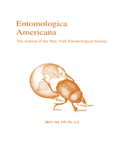
Entomologica Americana
Unveiling the Secrets of EntomologyEntomologica Americana is a pivotal journal in the field of Insect Science, published by the esteemed New York Entomological Society Inc. With its ISSN (1947-5136) and E-ISSN (1947-5144), this journal serves as a critical resource for researchers, professionals, and students dedicated to the study of entomology. Although it is categorized in the Q4 quartile for Insect Science as per the 2023 Scopus Rankings, where it ranks 179 out of 181, it continues to provide valuable insights into various aspects of insect biology, ecology, and conservation. The journal has been actively publishing since its convergence years from 2009 to 2017, and in selected years thereafter, including 2019, 2021, and 2023. Located at the iconic American Museum of Natural History in New York City, Entomologica Americana is a testament to the ongoing exploration and understanding of the insect world that underpins biodiversity and ecosystem health. Although it does not operate under an Open Access model, it offers a vital platform for scholarly communication and the dissemination of research findings, making it indispensable for anyone involved in or entering the fascinating field of entomology.

COLEOPTERISTS BULLETIN
Advancing Knowledge in Coleopteran EcologyCOLEOPTERISTS BULLETIN is a pivotal journal in the field of insect science, particularly focusing on the fascinating world of beetles. Published by the COLEOPTERISTS SOC, this journal disseminates high-quality research, illustrations, and literature reviews since its inception, with contributions spanning from 1988 to 2024. Though classified in Q3 of the insect science category as per the 2023 quartiles, it holds significant value for researchers, professionals, and students alike, offering insights into agricultural and biological sciences with an emphasis on coleopteran diversity and ecology. Based in the United States at the University of Georgia, this journal serves as a hub for scientific dialogue and advancements in the field. While it currently does not offer open access, its rigorously peer-reviewed articles ensure that cutting-edge research reaches a dedicated audience, promoting a deeper understanding of beetles' ecological roles and contributions to biodiversity.

SPIXIANA
Championing Rigorous Research in ZoologySPIXIANA is a distinguished journal dedicated to the fields of animal science and zoology, published by VERLAG DR FRIEDRICH PFEIL in Germany. With the ISSN 0341-8391, it has been contributing to the scientific community since its inception, with volumes converging from 2008 to 2024. Although currently listed in the Q4 quartile of the 2023 category rankings for Animal Science and Zoology, it provides a vital platform for researchers and professionals to disseminate significant findings in the field. Despite being unindexed in open access, SPIXIANA ensures that vital research reaches its audience, enhancing academic discourse and furthering our understanding of zoological sciences. Its commitment to sharing rigorous scientific research make it an important resource for anyone passionate about animal biology and conservation.

INSECT SYSTEMATICS & EVOLUTION
Transforming Knowledge in Insect Ecology and BehaviorINSECT SYSTEMATICS & EVOLUTION is a prestigious journal published by BRILL, which has been a vital source of scholarly information since its inception. Specializing in the fields of ecology, evolution, behavior, and systematics within the realm of insect science, this journal garners significant attention with its 2023 ranking in the second quartile across multiple categories, highlighting its relevance and impact in the field. With a focus on advancing knowledge through innovative research and reviews, it serves as an essential platform for researchers, professionals, and students alike, promoting an understanding of insect biodiversity and systematics. The journal’s accessibility options, including its Open Access policy, combined with a broad international scope, ensure that critical findings reach a diverse audience, fostering collaboration and discourse within the scientific community. Situated in the Netherlands, INSECT SYSTEMATICS & EVOLUTION maintains its commitment to excellence and strives to contribute actively to the ongoing dialogue in insect science, making it a must-read for anyone interested in the intricate world of insects.
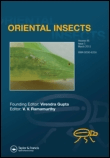
ORIENTAL INSECTS
Illuminating the Wonders of Oriental InsectsORIENTAL INSECTS is a distinguished journal dedicated to advancing the field of Insect Science, published by the reputable Taylor & Francis Ltd. With its long-standing history since 1967, this journal provides a platform for innovative research focused specifically on the diverse insect fauna of the Oriental region, encompassing topics such as taxonomy, ecology, physiology, and behavior. The journal is indexed with an ISSN of 0030-5316 and an E-ISSN of 2157-8745, making it easily accessible to a global audience. Although it currently does not operate under an Open Access model, its rigorous peer-review process ensures the dissemination of high-quality research. As a Q4 journal in the Insect Science category for 2023 and ranked 103 out of 181 in Scopus, ORIENTAL INSECTS remains a vital resource for researchers, professionals, and students seeking to enhance their understanding of insect biodiversity and conservation. Located in the United Kingdom, it is committed to promoting the latest scientific findings and fostering collaboration among entomologists worldwide, contributing significantly to the academic community.

NEW ZEALAND JOURNAL OF BOTANY
Cultivating Insights into New Zealand's Unique FloraThe New Zealand Journal of Botany, published by the esteemed Taylor & Francis Ltd, serves as a pivotal platform for disseminating significant research in the fields of Ecology, Evolution, Behavior and Systematics, as well as Plant Science. With a rich history dating back to 1963 and an impressive convergence extending to 2024, this journal has established itself as an essential resource for researchers and professionals dedicated to understanding the complexities of plant life and ecological systems in New Zealand and beyond. The journal is currently categorized in the Q3 quartile for both relevant disciplines as of 2023, reflecting its balanced influence within the global academic community. Although not an open access journal, it retains a significant impact factor, evidenced by its Scopus rankings, which place it within the top half of its categories. This makes it an invaluable tool for students, researchers, and academics aiming to engage with robust, peer-reviewed scientific findings and contribute to the evolving discourse surrounding botany and ecological research.
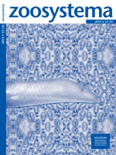
ZOOSYSTEMA
Catalyzing Knowledge in Animal ScienceZOOSYSTEMA is a prestigious academic journal published by PUBLICATIONS SCIENTIFIQUES DU MUSEUM, PARIS, specializing in the fields of Animal Science, Zoology, and Ecology. With a focus on advancing the understanding of biodiversity and evolutionary processes, this journal serves as a vital platform for researchers to disseminate significant findings and foster discussions within the scientific community. Boasting an impressive categorization in the Q2 Quartile rankings for both its primary fields, ZOOSYSTEMA is recognized for its impact and quality, as indicated by its notable positions in the Scopus rankings. While currently not Open Access, the journal provides essential insights and comprehensive reviews across its volumes published since 1998, making it a cornerstone in zoological and ecological research. Researchers, professionals, and students alike will find ZOOSYSTEMA an invaluable resource for understanding complex biological systems and their interrelations, contributing to informed conservation and management efforts globally.
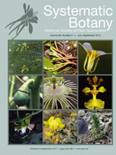
SYSTEMATIC BOTANY
Exploring the Depths of Botanical DiversitySystematic Botany, published by the American Society of Plant Taxonomists, is an esteemed journal focusing on the diverse fields of plant taxonomy, systematics, and evolution. With an ISSN of 0363-6445 and an E-ISSN of 1548-2324, this journal serves as a critical platform for researchers aiming to advance our understanding of plant biodiversity and evolutionary relationships. Operating since 1994, Systematic Botany has garnered significant recognition, achieving a Q2 ranking in Ecology, Evolution, Behavior and Systematics, and Plant Science categories, and ranking within the top half of Scopus for Genetics. The journal prioritizes publishing high-quality, peer-reviewed research, making it an essential resource for academics, practitioners, and students alike. Although it does not provide open access options, the journal's robust reputation in both American and international botanical research speaks to its pivotal role in disseminating vital scientific knowledge in the field. For those interested in the latest advancements in plant science, Systematic Botany is indispensable.

JOURNAL OF CONCHOLOGY
Fostering Knowledge in ConchologyJOURNAL OF CONCHOLOGY, published by the Conchological Society of Great Britain & Ireland, is a prominent academic journal focused on the study of mollusks, specifically their taxonomy, ecology, and evolutionary biology. Through its rigorous peer-review process, it aims to provide a platform for significant research in the field, fostering deeper understanding and appreciation of these diverse organisms. Although it is not currently an Open Access journal, its publications contribute notably to the fields of Agricultural and Biological Sciences, notably in Ecology, Evolution, Behavior and Systematics and Aquatic Science, as indicated by its rankings in Scopus. The journal's archives trace comprehensive coverage from 1981 to 1990 and from 1996 to 2018. With its commitment to advancing conchological knowledge, the JOURNAL OF CONCHOLOGY serves as a crucial resource for researchers, professionals, and students invested in the biological and ecological dimensions of mollusk studies.

ANNALES ZOOLOGICI FENNICI
Illuminating the Dynamics of Animal ScienceANNALES ZOOLOGICI FENNICI, published by the Finnish Zoological Botanical Publishing Board, is a prominent scientific journal dedicated to advancing the fields of Animal Science, Zoology, Ecology, Evolution, Behavior, and Systematics. Based in Finland and serving an international audience, this journal has been an essential resource since its inception in 1974, offering valuable insights into biodiversity, conservation, and ecological dynamics. While it holds a respectable Q3 quartile ranking across several relevant categories in 2023, its impactful contributions to the scientific community continue to promote critical discussions and foster research collaborations. Although the journal is not currently open access, its robust indexing in Scopus and recognition within the academic community underscore its significance. As a researcher, professional, or student, engaging with the ANNALES ZOOLOGICI FENNICI not only enriches your knowledge but also aligns you with the forefront of zoological research and conservation studies.